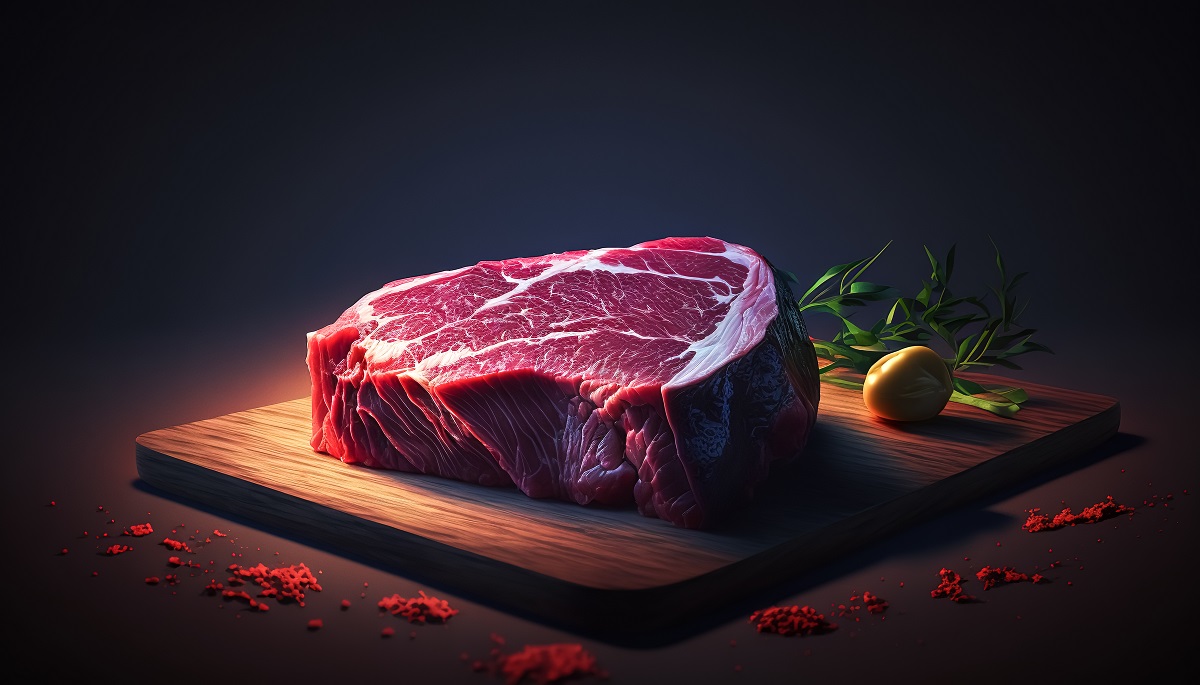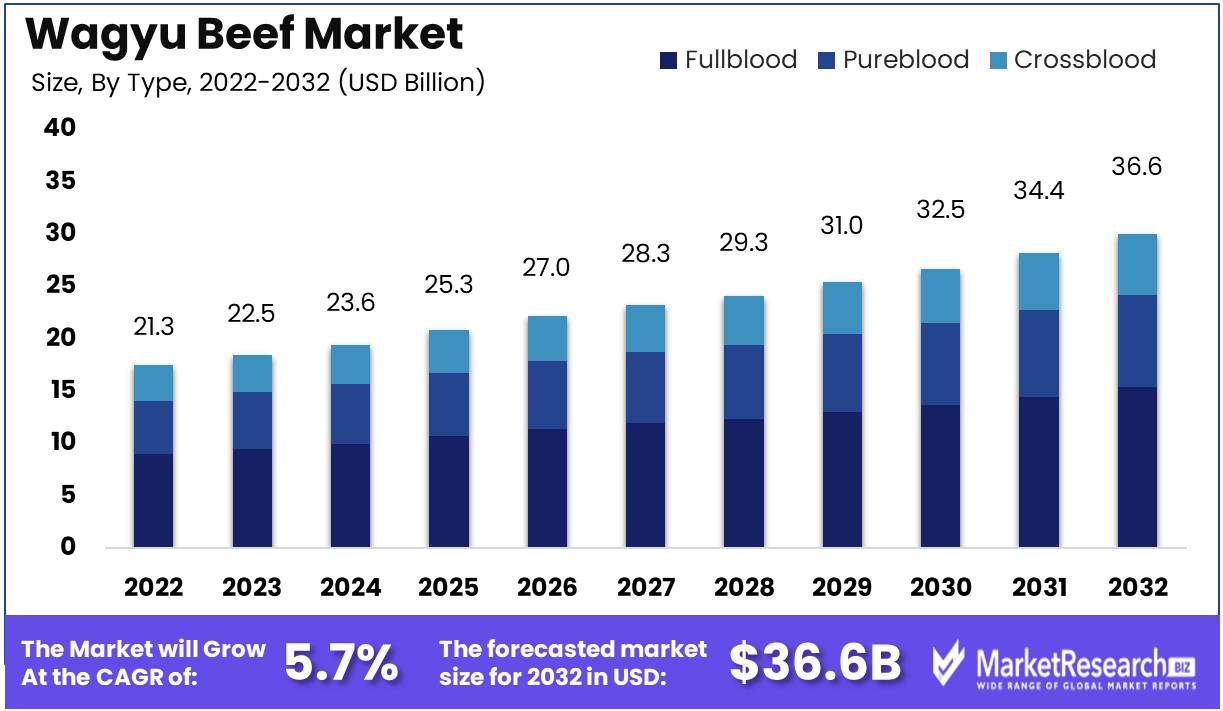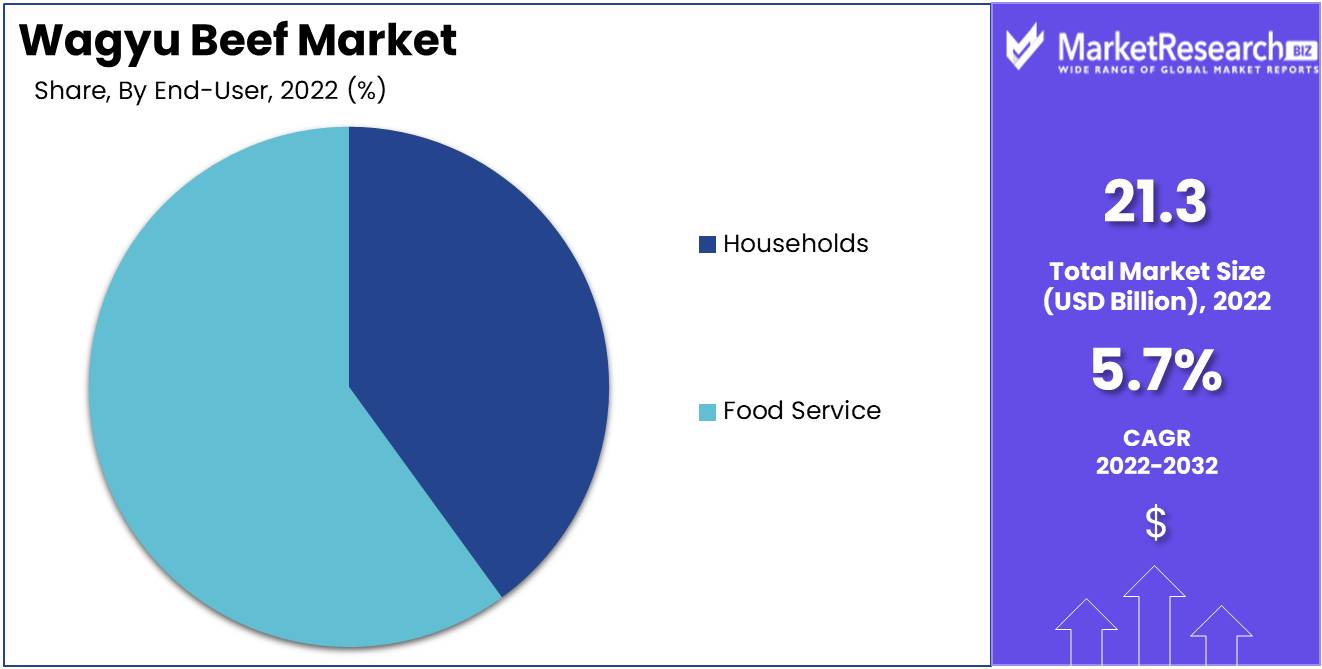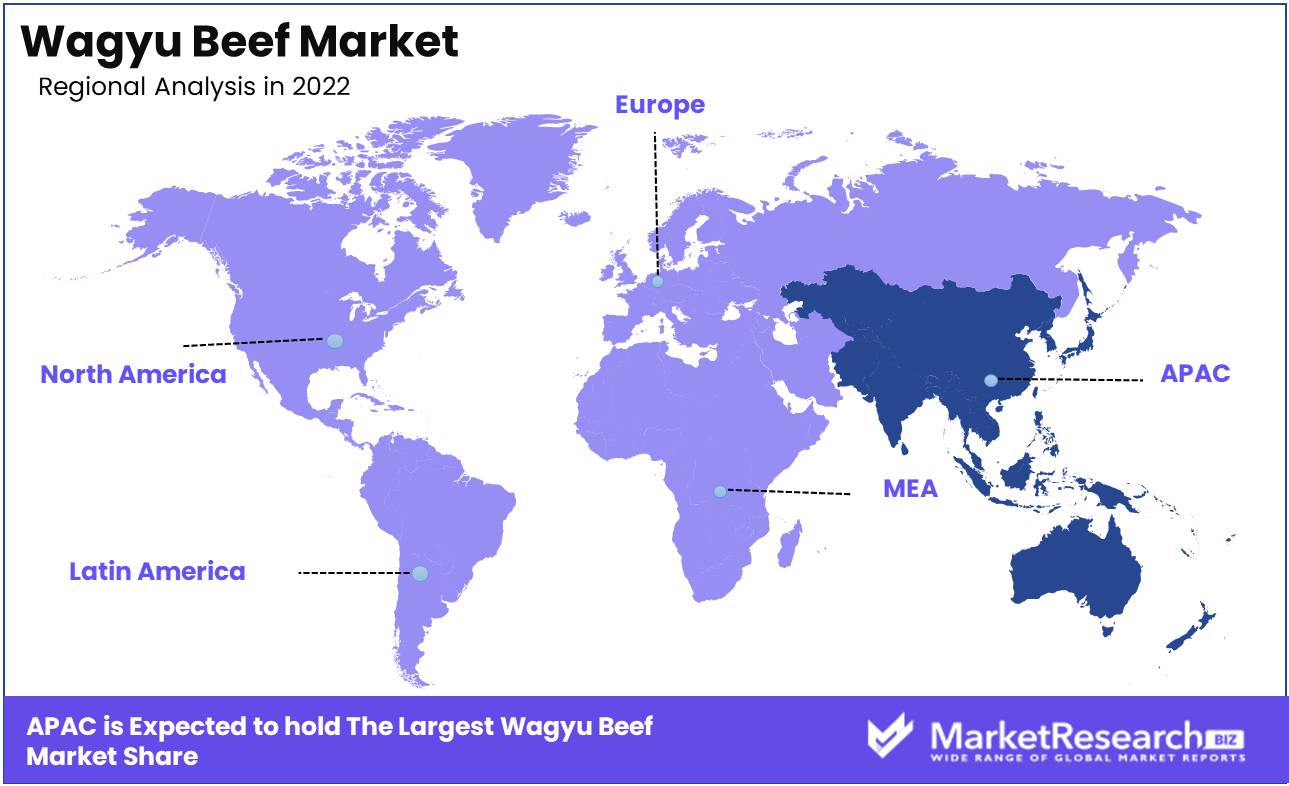
Wagyu Beef Market By Type (Fullblood, Pureblood, Crossblood), By Distribution Channel (Supermarkets, Specialty Meat Stores, Store Based Retail, Online Platforms, Other Distribution Channels), By End-User (Households, Food Service), By Region And Companies - Industry Segment Outlook, Market Assessment, Competition Scenario, Trends, And Forecast 2023-2032
-
40599
-
Aug 2023
-
190
-
-
This report was compiled by Shreyas Rokade Shreyas Rokade is a seasoned Research Analyst with CMFE, bringing extensive expertise in market research and consulting, with a strong background in Chemical Engineering. Correspondence Team Lead-CMFE Linkedin | Detailed Market research Methodology Our methodology involves a mix of primary research, including interviews with leading mental health experts, and secondary research from reputable medical journals and databases. View Detailed Methodology Page
-
Quick Navigation
Report Overview
Wagyu Beef Market size is expected to be worth around USD 36.6 Bn by 2032 from USD 21.3 Bn in 2022, growing at a CAGR of 5.7% during the forecast period from 2023 to 2032.

Wagyu beef refers to specific breeds of cattle from Japan that are prized for their rich marbling, buttery flavor, and melt-in-your-mouth tenderness. As a luxury product, wagyu beef caters to high-end restaurants and discerning home cooks who are willing to pay premium prices. The Wagyu beef market aims to meet the rising demand for quality meat while educating consumers on the unique advantages of Wagyu.
The key drivers of the Wagyu beef market include the growing preference for premium food, culinary tourism, and increased awareness of Wagyu's health benefits. Its high monounsaturated fat content is seen as healthier compared to saturated fats. Major investments by retailers and incorporation into restaurant menus have also expanded the market. Industries beyond food, like beauty and skincare, now leverage Wagyu's rich collagen content.
In recent years, product innovations such as wagyu beef burgers, sausages, and jerky have allowed more access to and creative use of this exclusive ingredient. Transparency about sourcing and production is also increasingly important to gain consumer trust. However, ethical concerns remain regarding animal welfare practices.
Overall, the applications and business opportunities linked to Wagyu beef tallow are multiplying. Specialty butcher shops and restaurants utilize Wagyu to attract customers and elevate dining experiences. Food entrepreneurs have also capitalized on Wagyu's popularity to launch niche products and businesses.
Looking forward, responsible production, clear communication, and delivering unique value will be key to the sustainable growth of the Wagyu beef market. As more consumers discover the unmatched eating quality of Wagyu, demand is expected to rise globally. But managing this premium market carefully will be critical to its future success.
Driving Factors
Increasing Consumer Preference for Premium and High-Quality Meat Products
In recent years, the demand for premium and high-quality meat products has significantly increased. This preference for high-quality products extends to the meat industry as well, as global consumers have become more discerning about the food they ingest. Wagyu beef is one type of meat that has acquired immense popularity in this regard. Wagyu beef, renowned for its exceptional tenderness, distinctive flavor, and exquisite marbling, has risen to the top of the list for consumers seeking the finest dining experience imaginable. The escalating demand for wagyu beef has been fueled by the expanding consumer preference for premium and high-quality meat products.
Increasing Awareness of Wagyu Beefs Unique Flavor and Marbling
Increasing awareness of wagyu beef's distinct flavor and marbling is another crucial factor contributing to its rising demand. Wagyu beef is renowned for its exceptional tenderness and exquisite flavor, making it a favorite among culinary enthusiasts and connoisseurs. The exceptional marbling of wagyu beef, which refers to the delicate distribution of fat throughout the meat, results in a buttery texture and a flavor that is unmatched. This information has spread among consumers through various channels, such as culinary blogs, social media, and word-of-mouth recommendations, thereby increasing the demand for Wagyu beef and driving its market expansion.
Expansion of Gourmet and Fine Dining Trends
The expansion of gourmet and fine dining trends has had a substantial impact on the rising demand for wagyu beef. Fine dining restaurants, renowned for their refined culinary experiences, have increasingly incorporated wagyu beef into their menus to satisfy the discriminating tastes of their customers. Gourmet cuisine and fine dining have become synonymous with ingredients of exceptional quality, and Wagyu beef falls perfectly into this category. Its tenderness, flavor, and marbling make it an excellent choice for caterers seeking to create unforgettable dining experiences. As gourmet and luxury dining trends continue their ascent, wagyu beef demand is anticipated to increase further.
Increasing Demand for Specialty Meat Products
In addition, the rising global demand for specialty meat products has significantly contributed to the expansion of the Wagyu beef market. Consumers are moving away from conventional meat options and investigating gourmet alternatives in search of novel and upscale options. Wagyu beef, with its exceptional quality and distinctive characteristics, is ideal for those in search of specialty meats. Its reputation as a premium and high-quality meat has catapulted it into the limelight, attracting consumers who value refined culinary experiences. The reputation of wagyu beef combined with the growing demand for specialty meat products has created a lucrative market for this exceptional meat.
Restraining Factors
Limited Supply and High Production Costs of Wagyu Beef
Due to limited supply and high production costs, Wagyu beef, renowned for its marbling and tenderness, faces challenges. Keeping wagyu cattle necessitates meticulous breeding and dietary management, which consumes time and resources. Due to their unique genetic characteristics, they develop slowly, extending the production cycle and limiting their availability. Even though this premium beef is now available on a global scale, the specialized rearing method remains a barrier to meeting the rising demand.
Potential Price Premium and Affordability Concerns
Due to its limited availability and high production costs, wagyu beef is priced at a premium due to its superior flavor and marbling. However, this increased price may restrict its availability to consumers with limited purchasing power. It is difficult to satisfy the needs of both the luxury market and a broader client base, necessitating the provision of more affordable beef options to accommodate a variety of tastes and budgets.
Potential Challenges in Maintaining Breed Purity and Quality Standards
Due to rising global demand, it is crucial to uphold breed purity and quality standards in the Wagyu beef market. Crossbreeding or misrepresentation of wagyu cattle could jeopardize the purity of beef. Maintaining integrity requires meticulous breeding programs, precise documentation, and adherence to standards. Authentic wagyu beef should originate from genetically verified Japanese breeds of wagyu cattle. For the preservation of a company's reputation, certification and traceability systems must be robust. Consumer confidence in the authenticity and quality of wagyu beef purchases is bolstered by breed associations and regulatory bodies' regular farm inspections and plain guidelines.
Potential Competition from Alternative High-Quality Beef Products
Although prestigious, Wagyu beef confronts stiff competition from other premium beef varieties such as Angus and grass-fed. To maintain its competitive advantage, wagyu must highlight its distinctive characteristics: unrivaled marbling, tenderness, and melt-in-your-mouth experience. Competition encourages producers to improve the quality of their products while emphasizing wagyu's distinct texture and flavor as the unrivaled option for discriminating consumers.
Type Analysis
The Fullblood Segment, which comprises purebred wagyu cattle, has historically dominated the wagyu beef market. Fullblood Wagyu beef is renowned for its superior marbling, flavor, and tenderness. This segment has gained considerable popularity among consumers who desire beef of the highest quality.
Economic growth in emerging nations is driving the adoption of the Fullblood Segment in the Wagyu beef market. As these nations experience rapid economic development, their citizens' purchasing power increases, allowing them to indulge in luxury foods such as wagyu beef. This development has made the market favorable for the Fullblood Segment.
Consumers have demonstrated a significant preference for the Fullblood Segment of the Wagyu beef market. They are willing to pay a premium for the exceptional and distinctive qualities of Fullblood Wagyu beef. The trend can be ascribed to the increasing awareness of the quality and authenticity of wagyu beef, as well as the desire to explore new and opulent culinary experiences.
Distribution Channel Analysis
The Store-Based Retail Segment predominates the Wagyu beef market. This segment consists of supermarkets, specialty meat shops, and gourmet food establishments where consumers can purchase wagyu beef for personal consumption. The store-based distribution of wagyu beef provides a variety of options and facilitates the general public's access to the product.
The adoption of the Store-Based Retail Segment in the Wagyu beef market is driven by economic growth in emerging economies. The demand for premium culinary products such as wagyu beef has increased as urbanization and disposable incomes have increased in these nations. Not only do store-based retail outlets meet the growing demand for wagyu beef, but they also provide a convenient platform for consumers to discover and purchase the product.
When purchasing Wagyu beef, consumers strongly favor the Store-Based Retail Segment. They value the retail outlets' convenience, dependability, and variety. Consumers can visit these establishments to receive expert guidance on wagyu beef selection and preparation, as well as to select from a variety of beef cuts and grades. The desire for a hassle-free purchasing experience and access to high-quality products drives this trend.
End User Analysis
The Food Service Segment dominates the Wagyu beef market in large part. This segment consists of restaurants, hotels, and catering services that provide consumers with wagyu beef-based dishes. Due to its capacity to meet the rising demand for high-quality and refined dining experiences, the Food Service Segment has risen to prominence.
The adoption of the Food Service Segment in the Wagyu beef market is driven by the economic growth of developing nations. As more consumers in these nations acquire access to disposable income, they are more likely to dine out and indulge in premium food experiences. This change in consumer behavior has resulted in an increase in demand for wagyu beef in a variety of restaurants.
When consuming wagyu beef, consumers exhibit a strong preference for the Food Service Segment. They appreciate the convenience of dining out, the opportunity to sample various wagyu beef dishes and the chef's skill in producing these delicacies. In addition to providing a social and experiential element, dining in restaurants allows consumers to experience wagyu beef in its finest form.

Key Market Segments
By Type
- Fullblood
- Pureblood
- Crossblood
By Distribution Channel
- Supermarkets
- Specialty Meat Stores
- Store-Based Retail
- Online Platforms
- Other Distribution Channels
By End-User
- Households
- Food Service
Growth Opportunity
Penetration into Untapped Markets
The Wagyu beef industry views untapped potential in China, India, and Brazil in order to capitalize on growth opportunities in markets with a growing population and disposable incomes. By emphasizing localized marketing, customizing products, and collaborating with local distributors, wagyu producers will be able to establish a dominant presence and become the preferred option for premium meat in these emerging regions, thereby driving growth.
Collaborations with Restaurants and Foodservice Providers
The expansion of the Wagyu beef market requires partnerships with restaurants and food service suppliers. These alliances offer benefits such as increased brand visibility, expanded audience reach, and diversified distribution channels. Collaboration with upmarket restaurants increases demand and sales by exposing the product to discerning diners. Partnering with hotels, caterers, and airlines facilitates volume orders and recurring business, thereby increasing revenue and market share.
Adoption of E-commerce and Direct-to-Consumer Sales Channels
The digital revolution has transformed consumer purchasing, and the Wagyu beef market must adjust accordingly. Adopting e-commerce and direct-to-consumer channels can stimulate growth by providing consumers with convenient access to premium products. Establishing an online presence, optimizing platforms, and ensuring a secure and informative shopping experience will increase consumer loyalty and trust.
Continuous Focus on Breed Improvement and Genetic Selection
Prioritizing breed improvement and genetic selection is essential if the Wagyu beef market is to continue its ascent. By investing in innovative research and development, manufacturers can improve product quality, enhance flavor and tenderness, and distinguish themselves in a competitive market. Improved breeding techniques allow for the optimization of cattle traits, ensuring that wagyu beef remains at the vanguard of the meat industry, appealing to consumers and fostering sustained market growth.
Latest Trends
Growth of Wagyu Beef in High-End Restaurants and Luxury Dining Experiences
Since time immemorial, Wagyu beef has been associated with exquisite cuisine and culinary experiences. It's exceptional marbling, melt-in-your-mouth texture, and unrivaled flavor have made it a top choice for upscale restaurants that cater to discriminating tastes. From Michelin-starred restaurants to those operated by celebrity chefs, wagyu beef has become a staple on gourmet menus, tantalizing diners with its exquisite flavor and opulent appearance. As more people seek out genuinely elevated dining experiences, the demand for wagyu beef in these settings continues to rise.
The Surging Demand for Wagyu Beef in Home Cooking and Gourmet Food Delivery
Beyond exclusive restaurants, wagyu beef has entered the kitchens of gourmet cuisine enthusiasts and home cooks. Due to the growing availability of wagyu beef in local markets and on the Internet, individuals can now prepare restaurant-quality meals in the comfort of their own residences. As individuals become more daring in their culinary endeavors, they embrace the challenge of cooking wagyu beef to perfection, experimenting with recipes and techniques to unlock its maximum potential. Moreover, the proliferation of gourmet food delivery services has made it easier than ever for consumers to experience wagyu beef dishes of restaurant quality without leaving their homes.
Utilization of Wagyu Beef in Fusion and Innovative Culinary Creations
The versatility of wagyu beef has inspired an explosion of culinary innovation among chefs and home cooks. As the culinary landscape evolves, wagyu beef is increasingly utilized in fusion and innovative dishes. Wagyu beef sushi rolls, wagyu sliders, wagyu tacos, and even wagyu-infused pastas are some of the mouth-watering creations that result from their rich, buttery flavor. The adaptability of wagyu beef as an ingredient in both traditional and avant-garde culinary traditions is highlighted by this trend.
The Rise of Wagyu Beef as a Status Symbol and Gift Item
In addition to its culinary appeal, wagyu beef has become a status and opulence symbol. The association with luxury and exclusivity has increased its desirability among affluent consumers who wish to demonstrate their refined taste and hedonism. Wagyu beef has become a prized present, frequently given on special occasions or as a token of appreciation. The idea of giving wagyu beef as a gift connotes sophistication and generosity, making it an ideal option for those seeking to impress and exhibit admiration.
Regional Analysis
Due to its unparalleled quality, the Wagyu beef market is experiencing a surge in demand. This luxury beef market is dominated by the Asia-Pacific region, which is renowned for its high-quality meats. Japan, the birthplace of Wagyu, maintains its culinary superiority through rigorous breeding programs, whereas Australia has deftly combined Japanese genetics with local agricultural expertise. China is expanding its domestic production and imports at an accelerated rate. Despite Japan's historical significance, Australia and China have secured their positions as significant players through their strategic efforts.
Because of favorable cattle cultivation conditions and significant investments in research and technology, the Asia-Pacific region dominates the Wagyu beef market. As consumer preferences transition toward premium, ethically sourced meat, the region has positioned itself as a global leader in Wagyu production and supply, capitalizing on this trend.
Due to its extraordinary marbling, tenderness, and flavor, Wagyu beef has become a global staple in high-end restaurants and discerning homes. The Asia-Pacific region, including Japan, Australia, and China, has recognized this luxury beef's exponential growth potential. Their superiority in the Wagyu beef market has been solidified by their strategic positioning and innovative agricultural practices.
The exponential development of the Wagyu market in the Asia-Pacific region poses a threat to Japan's historical significance as the birthplace of Wagyu beef. Japan's market share has decreased as a result of its limited production capacity and intensifying competition from nations such as Australia and China. The region's prominence in the global Wagyu beef market is a result of its favorable climate, technological advances, and shifting consumer preferences.

Key Regions and Countries
North America
- US
- Canada
- Mexico
Western Europe
- Germany
- France
- The UK
- Spain
- Italy
- Portugal
- Ireland
- Austria
- Switzerland
- Benelux
- Nordic
- Rest of Western Europe
Eastern Europe
- Russia
- Poland
- The Czech Republic
- Greece
- Rest of Eastern Europe
APAC
- China
- Japan
- South Korea
- India
- Australia & New Zealand
- Indonesia
- Malaysia
- Philippines
- Singapore
- Thailand
- Vietnam
- Rest of APAC
Latin America
- Brazil
- Colombia
- Chile
- Argentina
- Costa Rica
- Rest of Latin America
Middle East & Africa
- Algeria
- Egypt
- Israel
- Kuwait
- Nigeria
- Saudi Arabia
- South Africa
- Turkey
- United Arab Emirates
- Rest of MEA
Key Players Analysis
At the vanguard of the Wagyu beef market, Black Hawk Farms has built a reputation for providing some of the highest-quality Wagyu beef in the United States. Black Hawk Farms ensures that its cattle are raised with the uttermost care and concern by adhering to sustainable and ethical agricultural practices. Their wagyu beef has a level of tenderness and marbling that sets them apart from the competition because they prioritize humane treatment.
Australian Agricultural Company Limited (AACo) maintains a prominent position in the global Wagyu beef market, demonstrating its commitment to quality and excellence. With extensive grazing lands across Australia, AACo has established a firm presence in both domestic and international markets. The company's emphasis on genetic selection and animal welfare contributes to the exceptional flavor profiles of its premium wagyu beef.
Starzen Co., Ltd. performs a crucial role in the Wagyu beef industry in Japan. This renowned company has perfected the art of breeding and nurturing wagyu cattle in order to produce meat of exceptional quality. Starzen Co., Ltd. has developed lineages renowned for their superior marbling, flavor, and texture by focusing meticulously on genetics. Combining traditional techniques with cutting-edge technologies, they consistently deliver wagyu beef that satisfies the most discriminating consumers' tastes.
Imperial Wagyu Beef, based in the United States, has acquired a prestigious reputation for producing premium Wagyu beef. The restaurant's dedication to providing an exceptional dining experience is apparent in every mouthful. Imperial Wagyu Beef provides customers with wagyu beef that exceeds their expectations in terms of flavor, tenderness, and juiciness by meticulously managing their herd and implementing cutting-edge feeding techniques.
Top Key Players in Wagyu Beef Market
- Black Hawk Farms (U.S.)
- Australian Agricultural Company Limited (Australia)
- Starzen Co. Ltd. (Japan)
- Imperial Wagyu Beef (U.S.)
- Toriyama Umami Wagyu (Japan)
- Mishima Reserve (U.S.)
- Snake River Farms (U.S.)
- Blackmore Wagyu (U.S.)
- Lone Mountain Cattle Company (U.S.)
- K.C. Cattle Company (U.S.)
- Nebraska Star Beef (U.S.)
- Middle East Fuji L.L.C. (UAE)
- Tajimaya UK ltd. (U.K.)
- Holy Grail Steak Co. (U.S.)
- DeBragga and Spitler (U.S.)
- Chicago Steak Company (U.S.)
- Creek Bed Country Farmacy L.L.C. (U.S.)
- The Butcher's Market (U.S.)
- West Coast Prime Meat (U.S.)
Recent Development
- In 2023, Japan will significantly increase its exports of wagyu beef to the United States, according to a groundbreaking announcement. This move seeks to meet the soaring demand for Wagyu beef, which is renowned for its exceptional marbling and tenderness. This development is not only exciting for steak lovers in the United States, but it also demonstrates Japan's commitment to expanding its global presence as a prominent exporter of wagyu beef.
- In 2022, Australia, renowned for its production of high-quality wagyu beef, has recently announced intentions to establish a new wagyu beef farm in Queensland. This initiative is unsurprising given the nation's extensive agricultural history and favorable climate for raising cattle. Australia is poised to strengthen its position as a leading global actor by increasing its production capacity to meet the rising demand for wagyu beef. The new farm is anticipated to considerably contribute to the country's Wagyu beef supply chain.
- In 2021, In a progressive step, South Korea introduced a new wagyu beef certification program, with the goal of ensuring that domestically produced wagyu beef meets exceptional quality standards. This initiative highlights South Korea's commitment to preserving the authenticity and integrity of the Wagyu beef industry. Through the implementation of a certification program, consumers can now readily recognize South Korean Wagyu beef for its exceptional flavor, texture, and stringent production standards. This development augurs a heightened dining experience for both domestic and foreign consumers pursuing premium Wagyu cuts.
- In 2020, In a historic move, the United States lifted its restriction on Japanese wagyu beef imports. This decision paved the way for American consumers to enjoy the legendary Wagyu beef from Japan, which is renowned for its richness and flavor. The lifting of the prohibition marked an important turning point in U.S.-Japanese trade relations, facilitating trade opportunities and increasing the availability of authentic wagyu beef on the American market. Consequently, Americans can now enjoy the internationally renowned Wagyu delicacy on their native turf.
Report Scope
Report Features Description Market Value (2022) USD 21.3 Bn Forecast Revenue (2032) USD 36.6 Bn CAGR (2023-2032) 5.7% Base Year for Estimation 2022 Historic Period 2016-2022 Forecast Period 2023-2032 Report Coverage Revenue Forecast, Market Dynamics, COVID-19 Impact, Competitive Landscape, Recent Developments Segments Covered By Type (Fullblood, Pureblood, Crossblood)
By Distribution Channel (Supermarkets, Specialty Meat Stores, Store Based Retail, Online Platforms, Other Distribution Channels)
By End-User (Households, Food Service)Regional Analysis North America – The US, Canada, & Mexico; Western Europe – Germany, France, The UK, Spain, Italy, Portugal, Ireland, Austria, Switzerland, Benelux, Nordic, & Rest of Western Europe; Eastern Europe – Russia, Poland, The Czech Republic, Greece, & Rest of Eastern Europe; APAC – China, Japan, South Korea, India, Australia & New Zealand, Indonesia, Malaysia, Philippines, Singapore, Thailand, Vietnam, & Rest of APAC; Latin America – Brazil, Colombia, Chile, Argentina, Costa Rica, & Rest of Latin America; Middle East & Africa – Algeria, Egypt, Israel, Kuwait, Nigeria, Saudi Arabia, South Africa, Turkey, United Arab Emirates, & Rest of MEA Competitive Landscape Black Hawk Farms (U.S.), Australian Agricultural Company Limited (Australia), Starzen Co. Ltd. (Japan), Imperial Wagyu Beef (U.S.), Toriyama Umami Wagyu (Japan), Mishima Reserve (U.S.), Snake River Farms (U.S.), Blackmore Wagyu (U.S.), Lone Mountain Cattle Company (U.S.), K.C. Cattle Company (U.S.), Nebraska Star Beef (U.S.), Middle East Fuji L.L.C. (UAE), Tajimaya UK ltd. (U.K.), Holy Grail Steak Co. (U.S.), DeBragga and Spitler (U.S.), Chicago Steak Company (U.S.), Creek Bed Country Farmacy L.L.C. (U.S.), The Butcher's Market (U.S.), West Coast Prime Meat (U.S.) Customization Scope Customization for segments, region/country-level will be provided. Moreover, additional customization can be done based on the requirements. Purchase Options We have three licenses to opt for: Single User License, Multi-User License (Up to 5 Users), Corporate Use License (Unlimited User and Printable PDF) -
-
- Black Hawk Farms (U.S.)
- Australian Agricultural Company Limited (Australia)
- Starzen Co. Ltd. (Japan)
- Imperial Wagyu Beef (U.S.)
- Toriyama Umami Wagyu (Japan)
- Mishima Reserve (U.S.)
- Snake River Farms (U.S.)
- Blackmore Wagyu (U.S.)
- Lone Mountain Cattle Company (U.S.)
- K.C. Cattle Company (U.S.)
- Nebraska Star Beef (U.S.)
- Middle East Fuji L.L.C. (UAE)
- Tajimaya UK ltd. (U.K.)
- Holy Grail Steak Co. (U.S.)
- DeBragga and Spitler (U.S.)
- Chicago Steak Company (U.S.)
- Creek Bed Country Farmacy L.L.C. (U.S.)
- The Butcher's Market (U.S.)
- West Coast Prime Meat (U.S.)




